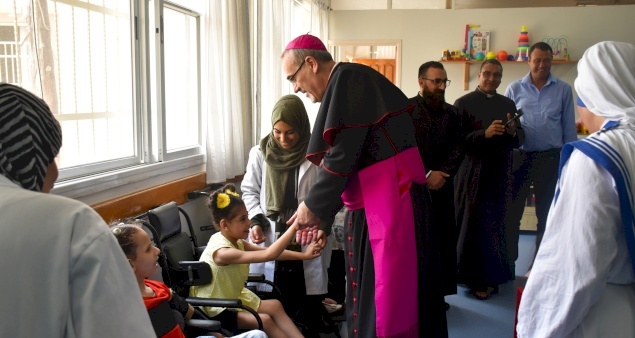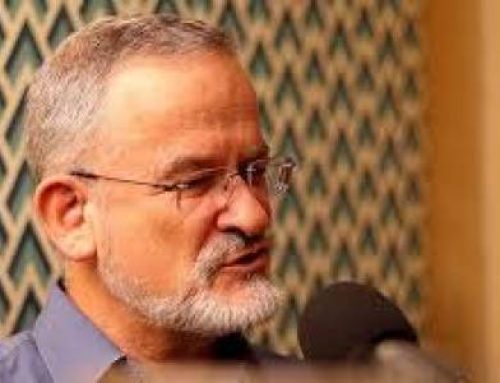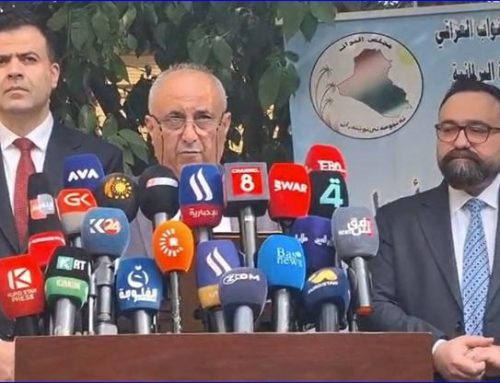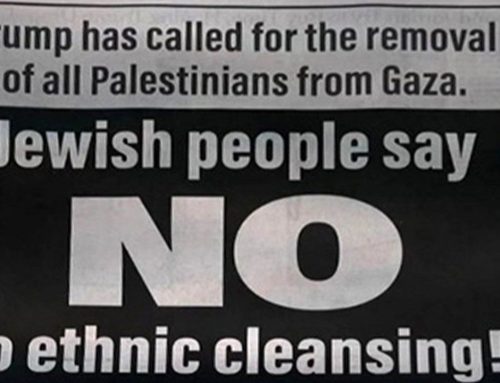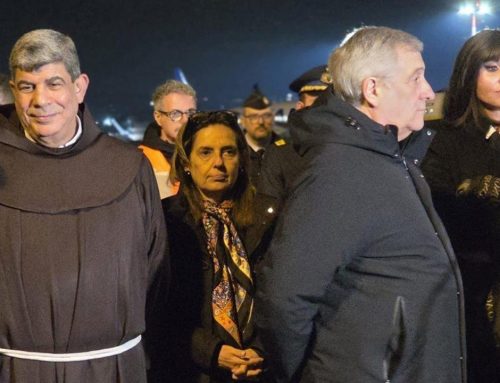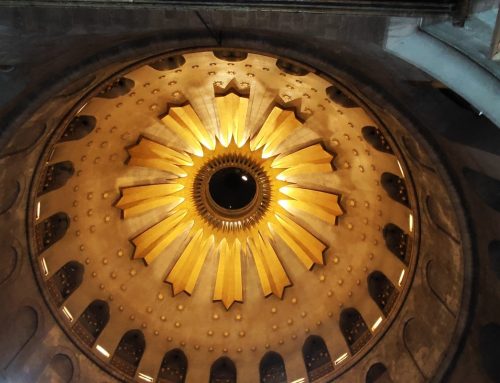GAZA – Twice a year, His Beatitude Mgr Pierbattista Pizzaballa, Latin Patriarch of Jerusalem, visits Gaza to meet the Christian community. This time, he came accompanied by Fr. Davide Meli, Chancellor of the Patriarchate, Fr. Carlos Ferrero, IVE, and Abdallah Dababneh, who studies at the Patriarchal seminary.
Five days across the Gaza Strip. Between visits, meetings, inaugurations and convivial times, the program of the Patriarch and his delegation was full. Two afternoons and one morning were entirely dedicated to visits to Christian families: a dozen of them were able to receive Mgr Pizzaballa in their homes to meet him in person and to take a moment to discuss.

With a Christian family of Gaza
Among these families, that of Jeries Michail, the only Christian living with his wife Soha outside Gaza, in the town of Khan Yunis. “My grandfather came from Egypt and married a woman from Khan Yunis,” Jeries explained. “All their children left Palestine except my father, who chose to remain. Me and my siblings grew up here, in Khan Yunis, but when my siblings got married they left, and I stayed. I opened up a store and things went well; people trusted me, I did good. Now leaving would mean losing all my customers, losing that relationship I have with everyone here in town. Yes, it is not always easy, yes, some do not agree with us and our religion, but in the end it’s worth it to stay.”
“I married Jeries at 14,” tells his wife, Soha. “I used to have an aunt who lived here, in Khan Yunis, and we came to visit her. That’s how Jeries and I met. So when we got married, even though I worked in Gaza as a teacher, I did not hesitate to come live here; I knew people, there was my aunt, the environment was still Christian. Then the family members I had here died, and we found ourselves the only Christians remaining.”

Jeries Michail and his wife Soha with Mgr Pizzaballa
Originating from Jaffa, Ashkelon, Gaza, these families have all demonstrated an impressive joy and resilience in the face of the difficult situation they have to deal with every day. “I felt in them a greater serenity, a greater appeasement,” said the Patriarch. “This year, obtaining exit permits for the holidays has been easier, and many Christians have been able to benefit from them. I really felt it during these meetings, especially compared to last year, when the war in June 2021 created a climate of tension and fatigue that weighed heavily on the shoulders of Gazans.”
In addition to these visits, the Patriarch also devoted several times to the Christian youth of Gaza, including the inauguration of a soccer and basketball field, a time of meeting with the scouts of the parish, as well as a day of activities for the youngest, organized in the parish yard.
From left to right and from top to bottom: the Patriarch with the Scouts of Saint Joseph, the inauguration of the soccer field, and the parish fair
On these occasions, the scouts were able to express their gratitude to the Patriarch and the Patriarchate for their support of the Christians in Gaza, as well as demonstrate their musical and dancing skills through a scout parade after Sunday mass and a dabke demonstration during the parish fair.
Parade of the St Joseph scouts
During his stay, the Patriarch was also invited to celebrate the Feast of the Sacred Heart of Jesus, traditionally celebrated in Bethlehem by the Salesians. During his homily, he emphasized the important role that love should play in everyone’s life: “Love is an attitude, not just an emotion or a feeling. It is a behavior, a lifestyle that we must build day by day, with the help of Jesus. Without him, we are unable to truly love, to love as he has loved us and still loves us, unconditionally.”
After the celebration, with the altar servers of the parish
Mgr Pizzaballa also presided over the Sunday Mass, during which a little girl was baptized – a moment of celebration and joy for the entire parish.
Baptism at the Church of the Holy Family
The stay in the Gaza Strip also allowed the Patriarch and his delegation to visit several hospitals and clinics, and to see firsthand the work of Caritas Jerusalem. Four families living in extreme poverty, beneficiaries of the “Family to Family” project, which was created by Caritas Poland and which provides assistance to about a hundred families a year, were visited by Mgr Pizzballa and his delegation, along with the Caritas team.
Visit of a family living in Rafah, at the south of Gaza
In Gaza, this “Family to Family” project has been in place for three years. Most of the beneficiaries – – families made up of women with children and absent or sick husbands, who are sometimes heavily indebted or living in slums – receive financial aid to be able to feed themselves, buy medicine or pay off family debts. “These people, often women, are the real fighters in Gaza. They are fighting to survive, to offer their children decent living conditions, to get their husbands out of poverty,” says a Caritas employee.
“In the entire Gaza Strip, we are helping between 80,000 and 100,000 people. During the COVID-19 crisis, we intervened in more than 70 percent of the cases. Of course, our funds are limited, so we have to make choices: according to the family situation, the economic situation, whether there are children, elderly people, disabled people…” explains George Antone, administrator of Caritas Jerusalem in Gaza. “We also have clinics that provide basic health care to all, and refer people who need specialists to other hospitals or specialized doctors.”
Caritas Jerusalem was founded in 1967, after the Six-Day War. It is a humanitarian and development
organization attached to the Catholic Church in the Holy Land.
Two hospitals not linked to Caritas Jerusalem were also visited by Mgr Pizzaballa: the Arab Christian hospital Al-Ahli, and the Jordanian hospital Gaza 71, whose staff, originally from Jordan, changes every three months. Despite supplying difficulties, especially electricity, but also financial issues, due to the COVID-19 crisis and the war in Ukraine, these hospitals continue to provide free care to patients. The Patriarch expressed his gratitude and support for these medical facilities, which provide essential humanitarian aid to the Gaza Strip.
From left to right: Al-Ahli Arab Hospital and Gaza 71
Also in terms of humanitarian but also social initiatives, the Patriarch took time to visit the center of the Missionary Sisters of Charity, within the parish, which takes care of severely disabled children. After being welcomed by a little girl and a little boy from the center, Mgr Pizzaballa spent some time with the children before discussing the center with the three sisters in charge.
With the children of the center
At the end of the stay, concluded by a meal shared with the parishioners, the Patriarch said goodbye to all those who, during these five days, had contributed to make his stay memorable and warm, caracterized by the unconditional welcome of the Gazans and their willingness to serve. “Coming here is not only to solve problems, to bring help. It is also to meet the people, the Christians of Gaza. I am a pastor, and they are my flock.”
By: Cécile Leca/ lpj.org

